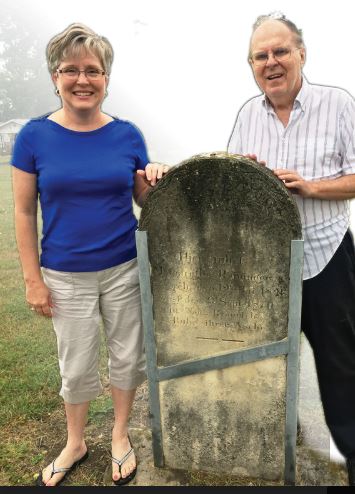Written by Carol Baass Sowa, for Today’s Catholic
Back in the 1970s, Everett Fey chanced to be shown an old sacramental register at his parish church, Sts. Peter and Paul in New Braunfels. Noticing some of his ancestors’ names, he photocopied pages of the book for further study and, as his niece, Carolyn Fey Phelan, says, “He was hooked.” Phelan recalls her grandmother (Fey’s mother), talking about his single-mindedness on doing research down at the Comal County Courthouse, where he poured over old birth and death certificates to piece together the family tree. So absorbed was he in this effort, he would bring his lunch in a brown paper bag to be able to conveniently step outside and eat on the courthouse steps. He also made numerous trips to area cemeteries, studying headstones and charting who was related to whom and where they were buried.

What began immersing himself in his family’s history and genealogy naturally expanded into the history of New Braunfels and its founders, all of which tied into the history of Sts. Peter and St. Paul Parish and, beyond that, the history of the Catholic Church in Central Texas. Along the way, Fey collected and read countless books related to these subjects and became an author himself, penning several booklets on family history and genealogy and taking on an extensive research project on the founding families of New Braunfels, which culminated in an immense, two-volume set, New Braunfels: The First Founders, published to coincide with New Braunfels’ and Sts. Peter and Paul’s sesquicentennial year of 1995.
Fey had attended the community’s centennial celebration in 1945 as a child and remembered all his life how fabulous that was, notes Phelan.
Not surprisingly, one of his terms as president of the Comal County Genealogy Society (which later awarded him Life Membership) fell during the sesquicentennial year. He is considered one of the premier historians of New Braunfels and, as archives director for the parish, turned his former family home in New Braunfels into a storage facility for both the parish and Fey family archives.
When Phelan moved back to New Braunfels a few years ago, her husband having retired from the military, she could tell her uncle wanted her to become involved in his preservation of history. He invited her to attend the first Archives Committee meeting at the parish and began calling her frequently to share local history stories, which she was always eager to hear. Already busy with numer-
ous volunteer commitments-one being her recent presidency of the Federation of Texas A&M University Mothers’ Clubs— she was hesitant to get overly involved in his local history endeavors, but began to realize there were no other family members standing in line to take on his role of archivist/historian and she had become the “heir apparent.”
Phelan had always loved family history and had a strong sense of tradition, so had eagerly volunteered when someone was needed to take over responsibility for the votive candles at the church grotto. “My grandparents did that,” she said of the ministry she now heads, “and I remember, as a little girl, helping
them do that.” Her deep parish roots include three of New Braunfels’ “First Founders” – Stephan
Klein, Georg Wenzel and Heinrich Reininger. (“First Founders” are those who arrived in New Braunfels under Prince Carl of Solms-Braunfels between March 21 and July 31, 1845.) As the 175th anniversary for the parish and city approached this spring, Fey informed his niece, “It’s time to pass the torch to you. You’re it!” She had already been taking on a few assignments for him, such as the interview for the anniversary’s time capsule, but had not expected this pronouncement. However, she, like her uncle, was now “hooked.”
“It’s an adventure for me,” she relates. “I love New Braunfels so much and the history of it is just so rich. There is so much here that has made us who we are, and the Catholic Church history in New Braunfels is fascinating as well.” Having traveled the world in her husband’s military career and seen and attended many churches, they had always agreed nothing compared to New Braunfels’ Sts. Peter and Paul and they would retire here because of it.
She is still learning from her uncle, Phelan says, and can see that he is thrilled with what she has taken on so far. “I think it just makes his heart happy that I am suddenly dropped into this role,” she adds. He was excited about the display on the church’s history she had set up in the administration building for the May 4 anniversary celebration and is now looking forward to more people seeing it. Postponed because of the present pandemic, the celebration has been rescheduled for May 4, 2021.
Phelan, her father, her uncle Everett, his oldest daughter, and her oldest daughter recently traveled to area cemeteries so Fey could point out the graves of their ancestors. “Write down, record the oral history from the people who are older,” she advises, “because once they are gone, you are going to lose that, and you’ll never get it back.” Writing dates on the back of photographs is another “must” she emphasizes, having struggled to identify old photos without them. Next on her agenda will be seeing through to completion her uncle’s almost-finished book on the history of the Catholic Church in Central Texas, which culminates in the founding of Sts. Peter and Paul. Another member of the dedicated parish archives committee, Christine Ikels, has volunteered to help her with this, she notes.
As a historian, Phelan believes we can learn from those who have gone before us. “People sacrificed a lot to get us where we are today,” she says, “it’s important that we remember that and preserve it.”

